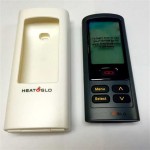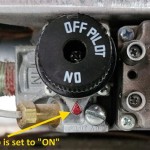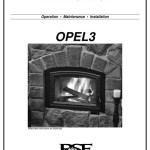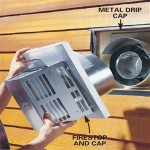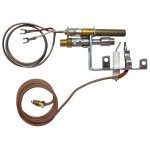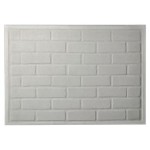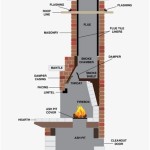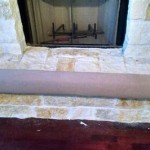Corner Vented Gas Fireplaces: A Comprehensive Overview
Corner vented gas fireplaces offer a unique and aesthetically pleasing heating solution for residential and commercial spaces. Unlike traditional fireplaces that are positioned against a straight wall, corner fireplaces are designed to fit snugly into the corner of a room, saving space and creating a focal point with a distinctive visual appeal. These fireplaces utilize natural gas or propane as fuel and require a venting system to safely exhaust combustion byproducts to the outside.
This article provides a detailed examination of corner vented gas fireplaces, encompassing their design, operation, benefits, installation considerations, maintenance requirements, and safety features. The discussion aims to equip potential buyers and users with the knowledge necessary to make informed decisions regarding the selection, installation, and use of these specialized heating appliances.
Design and Aesthetics of Corner Vented Gas Fireplaces
The primary advantage of a corner vented gas fireplace lies in its space-saving design and enhanced aesthetic flexibility. The corner placement allows for a fireplace in rooms where wall space is limited or where a conventional fireplace would disrupt traffic flow. This design also allows for a wider viewing angle of the flames, enriching the ambiance of the room. Corner fireplaces can be either symmetrical, with equal sides flanking the corner, or asymmetrical, featuring one side significantly longer than the other. The choice depends on the room layout and the desired visual effect.
The aesthetic options for corner vented gas fireplaces are extensive. The firebox itself can be configured with various media, including ceramic logs, glass beads, stones, and other decorative elements. These media options allow homeowners to personalize the fireplace to match their interior décor. Furthermore, the surrounding mantel or facing can be customized using a wide range of materials such as wood, stone, brick, or metal. The flexibility in design allows the fireplace to seamlessly integrate with any architectural style, from modern minimalist to traditional rustic.
Beyond the basic shape and materials, corner vented gas fireplaces often incorporate features such as accent lighting, remote controls, and adjustable flame heights. Accent lighting can be used to highlight the firebox or the surrounding mantel, creating a more dramatic visual effect. Remote controls offer convenience, allowing users to adjust the flame height and heat output from anywhere in the room. Adjustable flame heights provide greater control over the ambiance and the amount of heat generated by the fireplace.
Operation and Functionality of Corner Vented Gas Fireplaces
Corner vented gas fireplaces operate on the principle of controlled combustion of natural gas or propane. The gas is supplied to a burner within the firebox, where it is ignited to produce flames and heat. A venting system is essential for safely removing the combustion byproducts, including carbon dioxide, water vapor, and trace amounts of other gases, from the living space. Two primary venting systems are used: direct vent and B-vent.
Direct vent systems are sealed combustion systems, meaning they draw air for combustion from outside the house and exhaust combustion products directly outside through a coaxial vent. This type of vent consists of two pipes, one inside the other. The inner pipe exhausts the combustion gases, while the outer pipe draws in fresh air. Direct vent systems are considered safer and more efficient because they do not use room air for combustion, preventing potential drafts and reducing heat loss.
B-vent systems, also known as natural vent systems, use room air for combustion and rely on natural convection to vent the combustion gases through a vertical chimney or vent pipe. These systems are generally less expensive to install than direct vent systems, but they are also less efficient and require a taller vent stack to ensure adequate draft. B-vent systems must be installed in accordance with local building codes and regulations to ensure safe operation.
The heat output of a corner vented gas fireplace is typically measured in British thermal units (BTUs). The BTU rating indicates the amount of heat the fireplace can generate per hour. Corner gas fireplaces have BTU ratings that are suitable for supplemental heating of smaller or medium-sized rooms. The heat output can be controlled by adjusting the flame height or by using a thermostat. Some models also include a built-in blower that circulates warm air more efficiently throughout the room.
Installation Considerations and Safety Features
The installation of a corner vented gas fireplace requires meticulous planning and adherence to local building codes and manufacturer's instructions. The first step is to determine the appropriate size and BTU rating for the room. The fireplace should be sized to provide sufficient heat without overheating the space. Local building codes may dictate specific requirements for the fireplace’s setback distances from combustible materials, vent pipe clearances, and carbon monoxide detector placement.
Proper venting is crucial for the safe and efficient operation of a gas fireplace. The vent system must be installed according to the manufacturer's specifications to ensure proper draft and prevent backdrafting of combustion gases into the living space. The vent pipe must be made of approved materials and properly sealed to prevent leaks. Regular inspection of the vent system is recommended to ensure it remains in good condition.
Gas line connections must be performed by a qualified gas fitter or plumber. All gas connections must be leak-tested to ensure they are airtight. A shut-off valve should be installed near the fireplace to allow for easy shut-off of the gas supply in case of emergency. Carbon monoxide detectors should be installed in the vicinity of the fireplace to provide early warning of any carbon monoxide leaks.
Many corner vented gas fireplaces are equipped with safety features such as oxygen depletion sensors (ODS) and automatic shut-off valves. The ODS monitors the oxygen level in the room and shuts off the gas supply if the oxygen level drops below a safe threshold, preventing carbon monoxide poisoning. The automatic shut-off valve cuts off the gas supply if the flame is extinguished, preventing gas from leaking into the room.
Maintenance and Care of Corner Vented Gas Fireplaces
Regular maintenance is essential for ensuring the safe and efficient operation of a corner vented gas fireplace. At least once a year, the fireplace should be inspected and cleaned by a qualified technician. This inspection should include checking the burner, pilot light, vent system, and gas connections. The burner should be cleaned to remove any debris that could obstruct the gas flow. The pilot light should be adjusted to ensure a strong and stable flame. The vent system should be inspected for blockages or leaks.
The firebox and glass enclosure should be cleaned regularly to remove soot, dust, and other debris. Use a soft cloth and a mild cleaner to clean the glass. Avoid using abrasive cleaners, as they can scratch the glass. The decorative media, such as ceramic logs or glass beads, should also be cleaned periodically to maintain their appearance.
The area around the fireplace should be kept clear of combustible materials. Do not store flammable liquids or other hazardous materials near the fireplace. Keep curtains, furniture, and other fabrics at least three feet away from the fireplace opening. Supervise children and pets when the fireplace is in operation and install a safety screen to prevent accidental contact with the hot glass enclosure.
If you notice any unusual odors, noises, or smoke coming from the fireplace, immediately turn off the gas supply and contact a qualified technician for inspection and repair. Do not attempt to repair the fireplace yourself unless you are a qualified technician. Regular maintenance and prompt attention to any problems will help to ensure the safe and reliable operation of your corner vented gas fireplace for many years to come.
By understanding the design, operation, installation, maintenance, and safety aspects of corner vented gas fireplaces, users can confidently enjoy the warmth and ambiance they provide while ensuring a safe and efficient heating experience. Choosing the right fireplace requires a thorough assessment of individual needs and preferences, as well as careful consideration of the specific requirements of the installation location.

Corner Series Direct Vent Gas Fireplace By Majestic S Fireplaces

Heatilator Corner Direct Vent Gas Fireplace 36 By

Majestic Quartz 32 Direct Vent Gas Fireplace Warming Trends

Napoleon Ascent 36 Direct Vent Gas Fireplace Model B36

Corner Ventless Gas Fireplace Visualhunt

Majestic Direct Vent Gas Fireplace Corner

Direct Vent Corner Gas Fireplace Living Room

Superior 40 Inch Dv Traditional Corner Gas Fireplace Drt40c North Country Fire

Tahoe Deluxe 32 Direct Vent Gas Fireplace Remote Ready With Hearth And Corner Surround By Ventless Logs Com Specializing In Fireplaces
Corner Gas Fireplaces Heatilator
Related Posts

